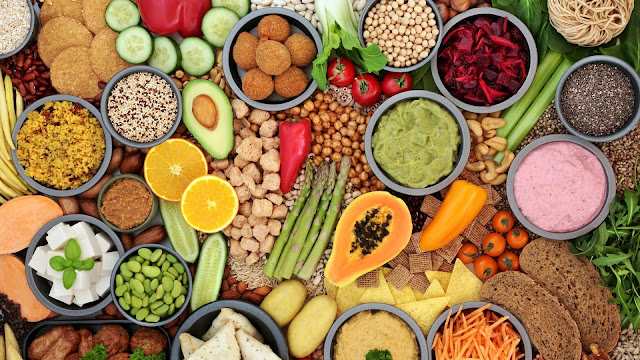How to eat more sustainably in 4 simple steps :
1. Embrace Plant-Based Foods :
Why It Matters:
Reduce the environmental impact: Eating less meat, do you even know how much good this can contribute to reducing your carbon footprint. The livestock industry is clearly a major greenhouse gas and deforestation contributor.
It lowers the risk of chronic disease: Better intakes in essential nutrients, fiber and antioxidants that are all available to plant-based diets helps fend off diseases such as heart disease, diabetes and a few cancers.
How to Get Started:
Add More Veggies( easy peep) - You can begin with adding more veggies, & fruits legumes, whole grains and seeds of vegetables to your meal. Strive to brighten up your plate for some diversity on nutrition.
Incorporate meatless Mondays (1 day a week where you have plant-based food) - For example: veggie stir-fries, lentil soups or quinoa salads.
Plant Based Proteins - Try tofu, tempeh, chick peas and black beans in place of meat. These fruits and items are also healthy yum snacks to binge upon!
2. Choose In Season And Local Fruits :
Why It Matters:
Sustainability is a huge factor that sets seasonal and local food apart from all else - because the more we are able to consume seasonally, the less it contributes to greenhouse gas emissions along its journey by way of transportation. They support sustainable farming practices and farmers.
Health Benefits-Harvested fully ripe so good flavor and as much nutrition.
How to Get Started:
Farmer's Markets are also good - you can usually score on-some season produce grown locally. Really good for supporting local farmers and to get some idea of what is available fresh.
Join a CSA: A box of locally harvested/produced fruits and/or vegetables each week from an area farm.
Know your Seasonable fruits and vegetables:
Know what actually on in the store during seasons, that's great. Although you can shop at grocery stores, buying fresh food from a nearby market will allow for better tasting dishes that have not been shipped halfway across the country.
3. Reduce Food Waste :
Why It Matters:
If your city doesn't compost much of that yard waste you can bet some methane is released from festering landfills, where many kitchens scraps go too instead.
Cardinale mentioned a few ancillary benefits of reducing food waste, like improved portion control and planning in meals. "consumers take smaller portions but more often when dining out which can be associated with better overall health"
How to Get Started:
Plan Your mealsYou can prepare a systematic meal plan (weekly and monthly) thus giving you the ability to have an already made shopping list that will spare your cart from overbuying. So that you only purchase necessity.
Makeover Meal Challenge - Are you someone who can take a leftover and make it something new? Leftover roasted veggies from yesterday, They can be so quickly turned into a satisfying soup or appetizing frittata.
Make Food Sanitary :
Proper food storage will keep you from your groceries by creating a place for them. Storage These are great entries: invest in airtight containers for your wet ingredients, freeze food that's about to go off and keep your fridge from getting too cluttered.
4. Support Sustainable Brands :
Now, this is another area where choosing from brands that put an emphasis on environmental responsibility can come in handy. Look for sustainable brands who source ethically, require minimal eco-friendly packaging.
Why It Matters:
Sustainable brands have broken this age-old divide and rewritten the rules, revolutionising fashion industry practices to start a positive impact cascade that others simply can no longer ignore.
Both you (and the planet) might be better off with health benefits: Some eco-friendly non-toxic brands may use natural, organic materials.
How to Get Started:
Seek certification - USDA Organic, Fair Trade and Rainforest Alliance. These labels indicate that the product meets certain environmental and social regulations.
If you are unable to find clothes that have been made ethically in your size or shipping constitutes the bulk of carbon emissions, then support local artisans and small businesses who uphold sustainable values. This both benefits your neighbors, and often times results in hand-made, high quality goods as well.
Opt for sustainable packaging- Opt to buy products with least packing to avoid wear and tear pollution as well. 6 Bring your own re-usable shopping bags, containers and produce bag.
Conclusion :
By eating sustainably, you are doing the best thing that not only helps your health to thrive but also aids our planet. Switching to a vegan diet, choosing seasonal or local produce buying in bulk reduce food waste, going for sustainability brands as well... that are the situations where you can definitly make some change :) However, it can be you who is going to be fitter and make for some kind of better world through small steps.
For more expert tips and lessons on how to live a healthier (sustainable) life, visit "Health Tips". And we together can make a change.




